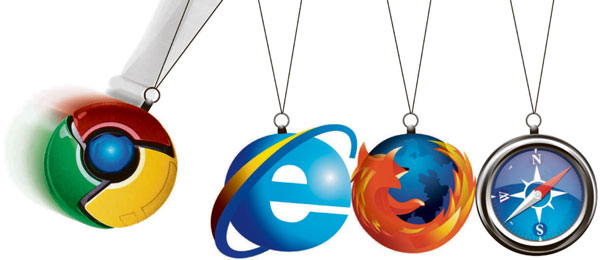Lashiec: Still, I wonder what's the reason of its existence, Google does not really need to launch a browser. I hope mouser's theory it's not the answer, otherwise both Opera and Firefox could be in BIG problems.
Read Google's comic book and their press release more carefully and you'll see that they're wanting some specific things from Chrome; that is, to have a browser that:
(1) Google itself can control, thus eliminating its middleman dependence on Microsoft or Mozilla or Apple, etc.;
(2) will give the company direct access to the user; and
(3) Google can write AIR/webware apps for;
(4) can potentially dominate the mobile and portable PC markets.

Think of cloud computing and your first reaction is: the weak link is the browser. Sure, this is a beta version. Gmail was in beta for years, so it will take a lot of feedback to bring this browser along. Thus, it's no secret what Google is trying to achieve with Chrome. In fact, the Google blog announcement was quite frank:
On the surface, we designed a browser window that is streamlined and simple. To most people, it isn't the browser that matters. It's only a tool to run the important stuff -- the pages, sites and applications that make up the web. Like the classic Google homepage, Google Chrome is clean and fast. It gets out of your way and gets you where you want to go.
Chrome's goal is to redefine the concept of the browser, and become a frame for other applications. In other words, Chrome is the long-awaited Google OS, a way of running Web-based applications like Gmail, Google Docs, Zoho Office, and the rest (the inclusion of Google Gears, which allows such apps to be used offline, is a big clue here). That Chrome's default function is as a browser is almost a historical accident. But Chrome is not a threat to Firefox, at least not in the short term. Even if Chrome takes off and becomes as reflexive as Googling, many people will still stick with Firefox as their browser. There are lots of reasons why they should -- for example, the fact that Firefox aims to optimize the browsing experience, not to function as a pseudo-operating system layer.
___________________
BACKGROUNDFirefox has long been pushing innovative features and forcing the more dominant player, Microsoft, to more aggressively advance its own IE browser, otherwise I get the feeling we'd still be using IE 6.0. Firefox will continue to be a rich
browser, wholly extensible, and will continue to grow because of the strength of its contributors. Chrome will be a lean environment in which to run apps and conduct search, email, etc.
This will be even more important for mobile devices.
AIR (Adobe Integrated Runtime) is a wrapper around a set of technologies that enables developers to build rich Internet applications that deploy on the desktop. Applications are created using a mixture of JavaScript, HTML, and Flash. The resulting application is delivered to end users in a single package and rendered using the WebKit HTML engine.
AIR apps don't look like what you think of when you think "web app." They look and feel very much like desktop applications. Because AIR applications are built using existing standards (HTML, JavaScript, Flash), they are cross-platform by default. AIR's goal is to be a true write once, run anywhere environment. (Again, whom does this hurt? Microsoft and its proprietary/lock-in strategy for its users -- IE only runs on Windows.)
Google's apps are built on AJAX, and when browsers handle Javascript inconsistently, Google looks quirky. If they write their apps to their own engine, it encourages users -- especially business users, including embedded device vendors -- a reason to switch to Chrome. And it gives Google a "platform" on which to build, much like Windows has been for Microsoft's desktop dominance.
Being open source, it is possible the Java engine might be ported to Firefox (but not to IE), and considering the relationship between Google and Mozilla, that doesn't seem too far-fetched. But Google cares as much about smart phones and other portable devices (EEE PCs) as they about a 'desktop' browser. If
Android and Chrome get a major share of the embedded market, Google will have inflicted permanent injury to Microsoft.
